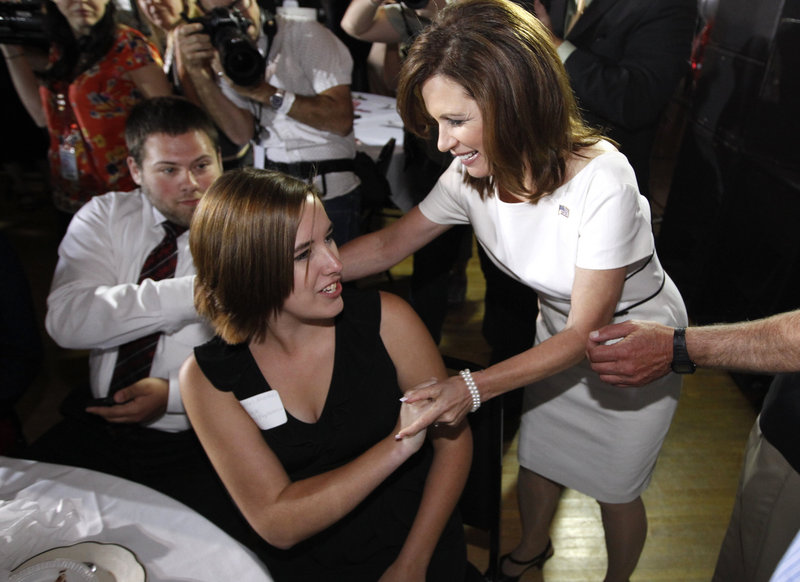WASHINGTON — GOP presidential candidate Michele Bachmann’s powerful fundraising force has gained some superpower.
The Minnesota congresswoman has two new so-called super PACs on her side that can raise unlimited cash from donors, corporations and anyone else who wants to see a President Bachmann in 2012.
Pro-Bachmann conservative activists Ken Blackwell, Ed Brookover and Bob Harris are among political activists taking advantage of the new political finance rules, created in the wake of the Supreme Court’s 2010 Citizens United decision, that allow the formation of new groups with few limits on their fundraising.
The pro-Bachmann groups are on the edge of a rapidly expanding trend in political fundraising that is poised to shape campaign spending next year. Super PACs have become the new powerful vehicle for high-dollar donors to influence elections, while decreasing the role that political parties play. As long as super PACs and their nonprofit cousins, known as 501(c)(4)s, stay independent of a candidate’s campaign, they can rake in as much as they want.
One super PAC supporting Mitt Romney raised more than $12 million to aid the former Massachusetts governor. A half-dozen super PACs are now backing Texas Gov. Rick Perry’s presidential efforts. Outside political groups led by Republican Karl Rove have pledged to raise $120 million to defeat President Obama in 2012. Pro-Obama and Democratic groups have joined in the fray, too.
Hundreds of millions of dollars will probably be funneled through these outside political groups in the 2012 elections for everything from House races to the presidential contest.
Super PACs and 501(c)(4) groups, which can raise money anonymously, burst onto the political scene after the Supreme Court’s Citizen United decision, in which the court essentially ruled that corporations and unions could directly spend money to influence elections.
So what makes a PAC super? Unlike normal political action committees, super PACs aren’t allowed to donate directly to a candidate’s campaign. But they have no limits on how much individuals, corporations or unions can contribute, something regular PACs and campaigns must adhere to.
There are other subtle but important differences. Super PACs are required to disclose their donors, unlike nonprofit 501(c)(4) groups. But the nonprofit groups are supposed to devote less than half of their funding toward politics. Some of the top outside political organizations, including Rove’s, have both a super PAC and a nonprofit, giving donors and fundraisers plenty of options.
It isn’t just Republicans getting in on the new money game. After criticizing the outside groups during the 2010 election, Democrats created their own committees to help with Obama’s re-election and also that of congressional Democrats.
One of the Democrats leading the charge is former White House deputy press secretary Bill Burton. This year, Burton left the Obama administration along with West Wing colleague Sean Sweeney to co-found Priorities USA and Priorities USA Action, two groups that will counter Rove’s.
Burton said Democrats had no other choice.
“These aren’t the rules that we like, but if they’re the rules the right wing is playing by, we’re not going to give them any advantages,” Burton said in an interview.
Some Democrats are critical of the new approach. Former U.S. Sen. Russ Feingold of Wisconsin lashed out at Burton’s groups in a June speech at the Netroots Nation convention in Minneapolis. “I empathize with the desire to fight fire with fire, but Democrats should just never be in the business of taking unlimited corporate contributions,” Feingold said. “It’s dancing with the devil, and it’s a game that we will never win. People will see us as weak and unprincipled. They will see us as ‘corporate-lite.’ “
Republicans have also pounced on the Democrats’ criticism of the conservative groups last year. “The fact that they’ve established these liberal groups on their side of the aisle while at the same time saying they oppose them is hypocritical at its best,” said Bryan Walsh, president of American Action Network, a nonprofit group co-founded last year by former U.S. Sen. Norm Coleman.
Send questions/comments to the editors.



Success. Please wait for the page to reload. If the page does not reload within 5 seconds, please refresh the page.
Enter your email and password to access comments.
Hi, to comment on stories you must . This profile is in addition to your subscription and website login.
Already have a commenting profile? .
Invalid username/password.
Please check your email to confirm and complete your registration.
Only subscribers are eligible to post comments. Please subscribe or login first for digital access. Here’s why.
Use the form below to reset your password. When you've submitted your account email, we will send an email with a reset code.